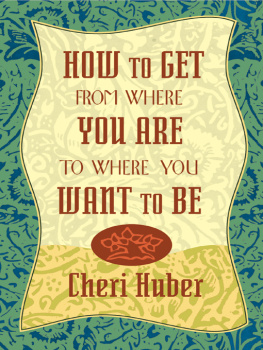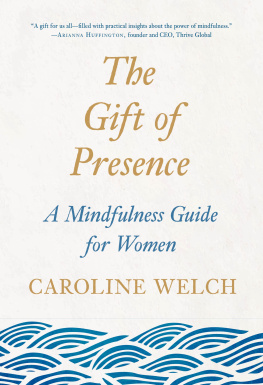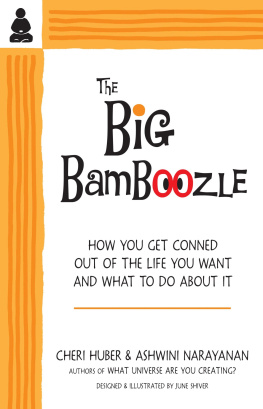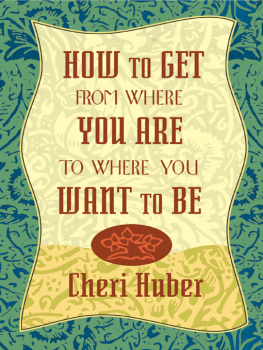Huber has been a Zen teacher for many years, but this does not feel at all like a Zen book.... The warmth of Hubers style and advice reinforce her message that self-acceptance, rather than punishment, is more likely to result in the changes we seek.
Library Journal
Huber challenges us to see our resistances and to accept our conditioned thoughts and behaviorsto live in the present moment with awareness.
Spirituality & Health magazine
ABOUT THE BOOK
According to Zen teacher Cheri Huber, we are conditioned to think that if we were only a little better in some way, we would be happy: Life isn't the way it should be and its my fault! But, Huber says, no amount of self-punishment will ever make us happy or bring us control over lifes problems.
The help we are looking for is really found in self-acceptance and kindness toward ourselves. By simply allowing ourselves to be guided by our innate intelligence and generosity, which are our authentic nature, we are able to be compassionately present to whats happening now. Compassionate self-disciplinethe will to take positive steps in lifeis found through nothing other than being present. When we are present and aware, we are not engaged in distracting, addictive behaviors. If we simply cultivate our ability to pay attention and focus on what is here in this moment, our experience can be authentic, awake, honest, and joyful.
The book includes a guided thirty-day program of daily meditation, contemplation, and journaling.
For more information on the author, Cheri Huber, visit her website at www.cherihuber.com.
CHERI HUBER is a Zen teacher and the author of eighteen popular books. She founded A Center for the Practice of Zen Buddhist Meditation in Mountain View, California, in 1983, and the Zen Monastery Retreat Center in Murphys, California, in 1987. She founded Living Compassion in 2003, a nonprofit group comprised of There Is Nothing Wrong with You Retreats (based on the book); Global Community for Peace: The Assisi Peace Project; The Africa Vulnerable Children Project; and Open Air Talk Radio, which she hosts weekly. She lives in Murphys, California.
Sign up to learn more about our books and receive special offers from Shambhala Publications.

Or visit us online to sign up at shambhala.com/eshambhala.
Making a Change for Good
A Guide to Compassionate Self-Discipline
CHERI HUBER

SHAMBHALA
Boston and London
2011
Shambhala Publications, Inc.
Horticultural Hall
300 Massachusetts Avenue
Boston, Massachusetts 02115
www.shambhala.com
2007 by Cheri Huber
Cover art: Gregory Adams/Lonely Planet Images/Getty Images
All rights reserved. No part of this book may be reproduced in any form or by any means, electronic or mechanical, including photocopying, recording, or by any information storage and retrieval system, without permission in writing from the publisher.
Library of Congress Cataloging-in-Publication Data
Huber, Cheri.
Making a change for good: a guide to compassionate self-discipline / Cheri Huber.1st ed.
p. cm.
eISBN 978-0-8348-2256-6
ISBN 978-1-59030-208-8 (alk. paper)
1. Self-control. 2. Control (Psychology) 3. Discipline. 4. Change (Psychology) 5. Conduct of life. I. Title.
BF632.H83 2007
17044dc22
2006050581
Contents
This eBook was designed using a font and layout resembling the print edition. For best display, please set your e-reader device to publisher defaults, if available, or adjust your fonts for optimal appearance.
Ive never met anyone who does not struggle with self-discipline. The problem with self-discipline is usually identified as a lack of willpower, a lack of follow through. You commit to a program, with every good intention, and wake up a few days later having failed.
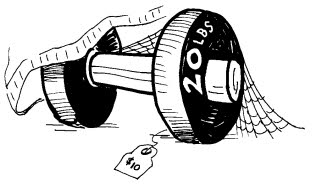
A few of us are on the other side of the continuum, so disciplined we fail at things like kindness, spontaneity, and relaxation. One way or another, the struggle to be disciplined takes a lot of energy, often misspent.
There is a convoluted belief about self-discipline that many of us have taken on:
THE BELIEF
If I were different - better, smarter, thinner, richer, more in control (which I would be if only I had more self-discipline!) - life would be as it should be and I would be happy. As it is, life isnt the way it should be and its my fault!

I contend that what we think of as the problem with self-discipline is not the problem at all, and the solutions we try, sincere as they are, lead only to frustration and failure. So, as I see it, this belief is not true.
Nothing in life is a matter of fault; no amount of self-discipline will ever give anyone control over life (control is an illusion); happiness does not depend on circumstances; and life is always exactly as it is!
There are two kinds of self-discipline.
1. Strict, harsh, and punishing
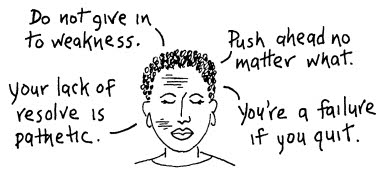
2. Supported, assisted, and nurtured
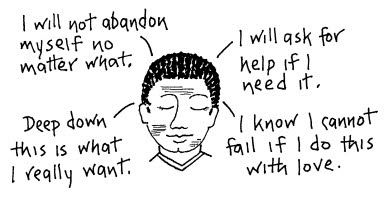
The first is familiar to us all.
The second, compassionate self-discipline, is nothing other than being present rather than engaged in distracted, unfocused, addictive behaviors based in an addictive behaviors based in an I-need-to-fix-myself mentality.
That person is actually paying attention, focusing on what is here to do in this moment, bringing compassion to all aspects of daily life, and discipline has nothing to do with it.
We dont lack self-discipline, we lack presence.
Compassionate self-discipline is simply allowing the intelligence and generosity that is your authentic nature to guide you in every moment.
With this guidance you will be not only disciplined, you will be spontaneous, clear, awake, aware, efficient, appropriate, respectful, grateful, kind, honest, sincere, expressive, steady, dependable, responsible, peaceful, joyful, and satisfied.
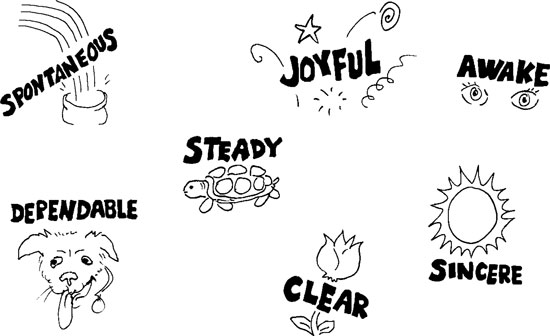
These are only a few descriptions of the experience.
Discovering compassionate self-discipline may be easier and harder than you thought.
On the one hand, it is not necessary to come up with more sophisticated methods for making your self do what your self does not want to do. No more planning, hoping, fearing, and failing.
On the other hand, you will need to choose in-the-moment presence over the habitual patterns of a conditioned mind.
CONDITIONED MIND
The everyday mind through which we interact with life is the result of a system of brainwashing called socialization. From the first moment of life a child is taught what is right, wrong, ugly, beautiful, sacred, worldly, important, valuable, worthless; who the right people are, which values are important, which god to believe in, what heaven is, what hell is, how a person should be, how others should be, how the world should be, how people should be punished, what it means to be a man, what it means to be a woman... In other words, every aspect of life has been programmed. (For most people, going beyond their childhood socialization is simply doing the opposite of what they were taught.) This program - whether adhering to it or rebelling against it - is what we call conditioned mind.
Next page

